32 Effective Vendor Termination Letters: Strategies for Smooth Transitions
At Vendor Termination Letters, we are your trusted resource for comprehensive and professional guidance on all matters related to vendor termination letters. Handling terminations is a critical aspect of business management, and we understand the significance of approaching these matters with care and respect. From understanding the importance of maintaining a positive tone in termination letters to ensuring compliance with contractual obligations and seeking legal advice in complex situations, our comprehensive content covers all aspects of termination. At Termination Letters, we value professionalism and ethical conduct in all aspects of our business. Explore our resources and let us be your trusted partner in navigating the complexities of termination with confidence and professionalism. Together, we can ensure a smooth transition and position your business for continued success.
Provide Adequate Notice
- Contractual Obligations: Review the vendor agreement to identify any specific notice periods or termination clauses outlined in the contract.
- Notice Period: Determine the length of the notice period required for termination as stated in the contract. It may range from a few weeks to several months, depending on the agreement.
- Communicate Early: Initiate the termination process as soon as the decision is finalized to provide the vendor with ample time to prepare for the termination.
- Written Notice: Deliver the termination notice in writing to ensure clear communication and to have a documented record of the notice sent.
- Include Effective Date: Clearly state the effective date of the termination in the notice to provide a definitive timeline for the vendor to wrap up operations.
- Obligations During Notice Period: Outline the responsibilities during the notice period, such as completing pending orders, delivering outstanding products or services, or transferring relevant information.
- Allow Time for Resolution: If there are any unresolved issues or concerns, the notice period provides an opportunity for the vendor to address and resolve them.
- Vendor Transition: If applicable, use the notice period to discuss a smooth transition plan with the vendor, especially if they are assisting with finding an alternative or transferring responsibilities.
- Contractual Compliance: Ensure that the termination notice adheres to any specific requirements mentioned in the contract for delivering the notice.
- Professionalism: Communicate the termination notice professionally and respectfully, avoiding any language that may be perceived as harsh or adversarial.
Seek Legal Advice
Seeking legal advice in complex or sensitive termination situations is a prudent step to ensure that the termination process is carried out in a legally compliant and appropriate manner. Here are some key points to consider regarding “Seek Legal Advice”:
- Legal Expertise: Engage the services of a qualified and experienced attorney or legal counsel who specializes in employment law, contract law, or the specific area related to vendor termination.
- Compliance with Laws: A legal expert can help ensure that the termination process adheres to all relevant federal, state, and local laws and regulations, including labor laws and contractual obligations.
- Mitigating Risks: Legal advice can assist in identifying and mitigating potential legal risks or liabilities associated with the termination, safeguarding your company from potential disputes or lawsuits.
- Contractual Review: The attorney can thoroughly review the agreement to understand the termination clauses, notice requirements, and any potential consequences of the termination.
- Negotiation Support: In sensitive cases, legal counsel can provide guidance and support during negotiations with the vendor, facilitating a smoother resolution and minimizing conflicts.
- Documentation: A legal expert can help draft the termination notice and any relevant documentation, ensuring that the language is precise, comprehensive, and legally sound.
- Alternative Solutions: If there are legal complexities or uncertainties surrounding the termination, seeking legal advice can help explore alternative solutions or dispute resolution methods.
- Dispute Resolution: In case of disagreements or conflicts during the termination process, legal counsel can guide you through the appropriate dispute resolution channels.
- Employee Rights: If the termination involves employees of the vendor, legal advice can help ensure that their rights and entitlements are protected as per labor laws.
- Confidentiality and Non-Disclosure: Legal counsel can address any confidentiality or non-disclosure concerns to protect sensitive information during and after the termination.
#1: Quality Issues – Vendor Contract Termination
We regretfully inform you that, due to persistent and unresolved quality issues with your products/services, we have made the difficult decision to terminate the contract between our companies. Despite our best efforts to address the concerns and work collaboratively, the repeated instances of subpar quality have had a significant impact on our operations and customer satisfaction. This decision is necessary to ensure our commitment to delivering high-quality products/services to our customers. The termination will be effective during which we request your cooperation in fulfilling any pending obligations and facilitating a smooth transition to an alternative vendor.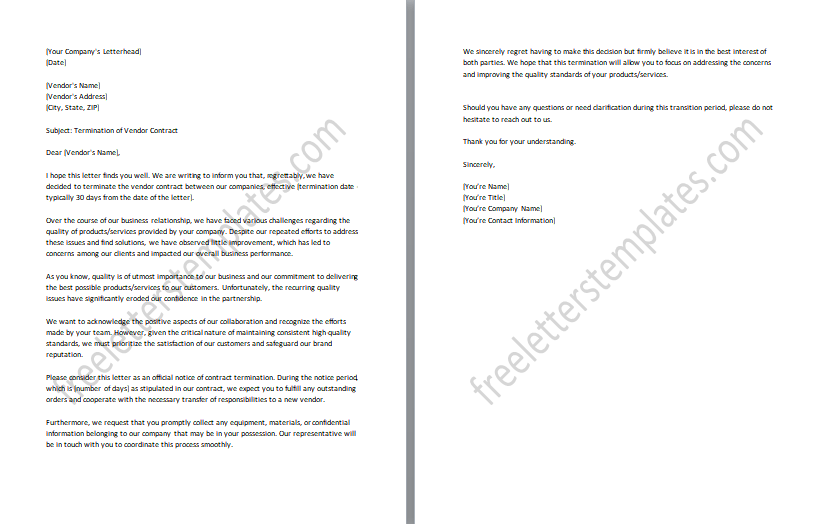
#2: Contract Breach – Vendor Termination Notice
The “Contract Breach – Vendor Termination Notice” is a formal letter to terminate a vendor’s contract due to a breach. It notifies the vendor of the decision and cites the specific breach. The letter emphasizes the importance of compliance and maintaining contractual integrity. It sets the effective termination date and explains the consequences of the breach on the company’s operations. It serves as an official notification of the termination, protecting the company’s rights.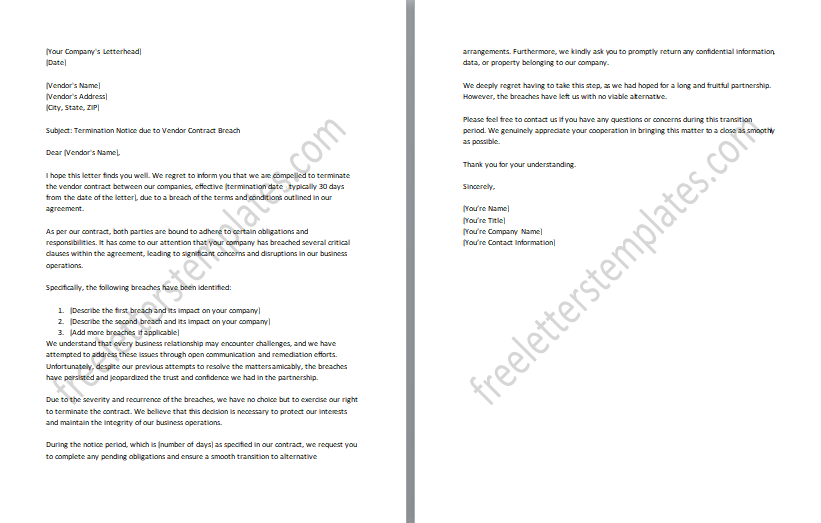
#3: Noncompliance with Regulations – Vendor Removal
The “Noncompliance with Regulations – Vendor Removal” letter is a formal communication used to inform a vendor about their removal from the company’s list of approved suppliers due to their failure to comply with relevant regulations. The letter explains the specific regulatory requirements that have not been met and highlights the importance of adherence to such standards. It notifies the vendor of the decision to remove them from the approved vendor list and provides an effective date for the removal.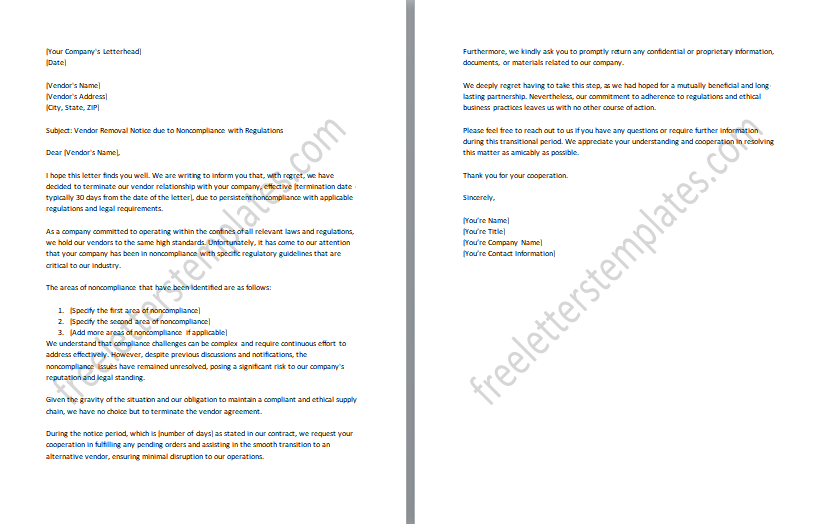
#4: Delivery Delays – Vendor Contract Cancellation
The “Delivery Delays – Vendor Contract Cancellation” letter is a formal notice issued by a company to terminate its contract with a vendor due to persistent delays in product or service deliveries. The letter outlines the instances of delivery delays experienced during the partnership and emphasizes the negative impact on the company’s operations and customer satisfaction. It communicates the company’s decision to cancel the contract in light of the repeated delays and inability to meet delivery timelines. The letter specifies the effective date of the contract cancellation and requests cooperation in fulfilling any outstanding obligations during the notice period.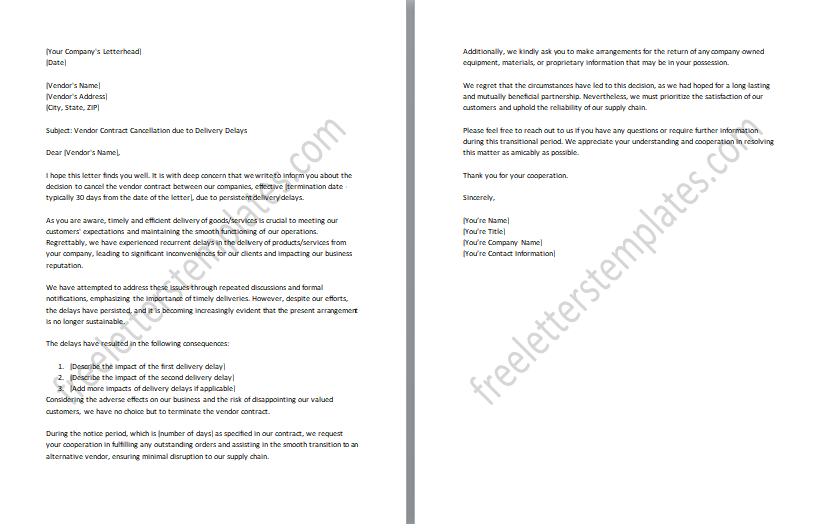
#5: Poor Customer Service – Vendor Termination Letter
The “Poor Customer Service – Vendor Termination Letter” is a formal communication used by a company to terminate its relationship due to inadequate customer service provided by the vendor. The letter highlights the specific instances or patterns of poor customer service experienced by the company, citing examples or incidents that have negatively impacted the company’s operations and customer satisfaction. It communicates the company’s decision to terminate the agreement based on the importance of maintaining high-quality customer service standards. The letter provides the effective date of the termination and requests the vendor’s cooperation in fulfilling any outstanding obligations during the notice period. The purpose of this letter is to seek an alternative that can deliver satisfactory customer service and ensure a positive experience for the company’s customers.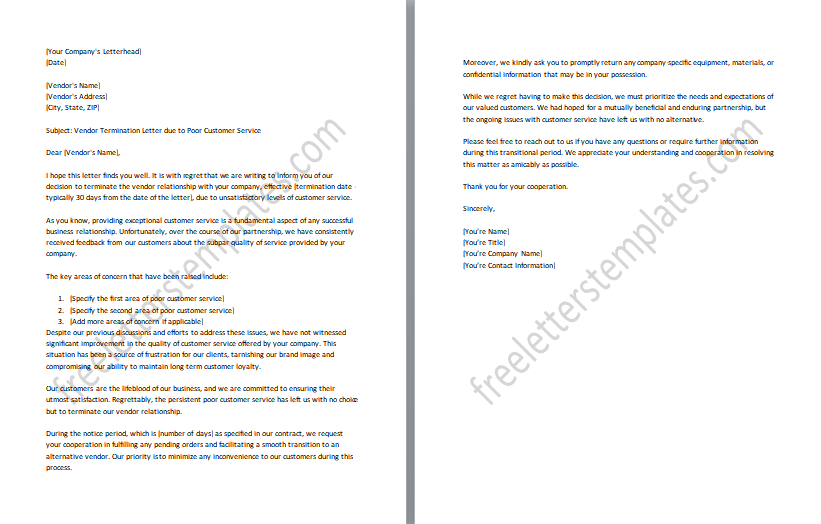
#6: Financial Instability – Ending Vendor Agreement
The “Financial Instability – Ending Vendor Agreement” is a formal notice issued by a company to terminate its agreement due to concerns over financial stability. It communicates the company’s decision to end the agreement to safeguard its financial interests and maintain a stable supply chain. The letter sets the effective date of the termination and requests the vendor’s cooperation in fulfilling any pending obligations during the notice period. The purpose of this letter is to mitigate potential financial risks and seek alternatives that can offer financial stability and reliability in their products or services.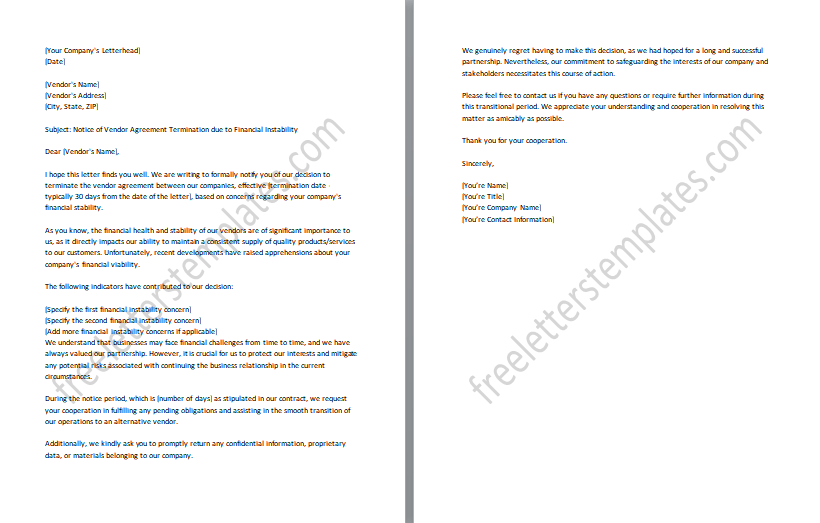
#7: Product Recall – Vendor Termination Notice
The “Product Recall – Vendor Termination Notice” is a formal communication used by a company to terminate its agreement following a product recall situation. The letter explains that the company has conducted a product recall due to issues with the products that have posed safety concerns or failed to meet quality standards. It communicates the company’s decision to terminate the vendor agreement to safeguard the company’s reputation and ensure the supply of safe products to customers. The letter specifies the effective date of the termination and requests cooperation in handling the recall process and any related obligations during the notice period.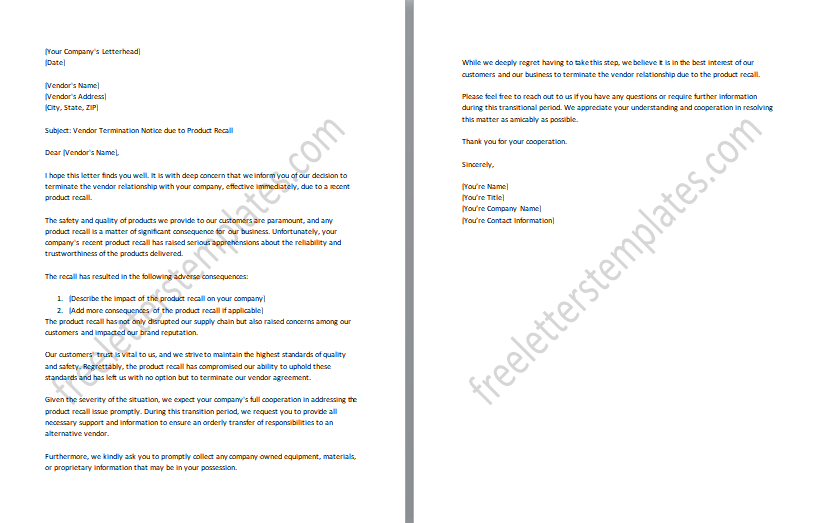
#8: Unauthorized Subcontracting – Vendor Removal Letter
The “Unauthorized Subcontracting – Vendor Removal Letter” is a formal notice issued by a company to remove from its approved list due to unauthorized subcontracting. The letter informs that the company has discovered instances where the vendor has subcontracted parts of the agreed-upon work to third parties without proper authorization. It communicates the company’s decision to remove the vendor from the approved list as subcontracting without permission breaches the terms of the contract. The letter specifies the effective date of the removal and requests cooperation in fulfilling any outstanding obligations during the notice period.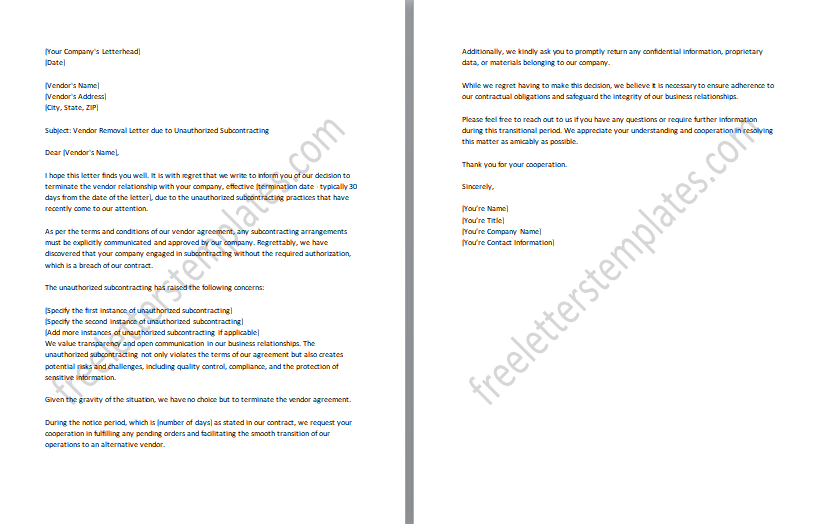
#9: Incomplete Documentation – Vendor Contract Termination
The “Incomplete Documentation – Vendor Contract Termination” is a formal letter used by a company to terminate its contract due to the failure to provide complete and accurate documentation as required by the agreement. The letter states that despite repeated requests for the necessary documentation, the vendor has not fulfilled their obligations, resulting in operational challenges and non-compliance with regulatory requirements. It communicates the company’s decision to terminate the contract based on the importance of adherence to contractual obligations and regulatory standards. The letter specifies the effective date of the termination and requests cooperation in fulfilling any pending obligations during the notice period.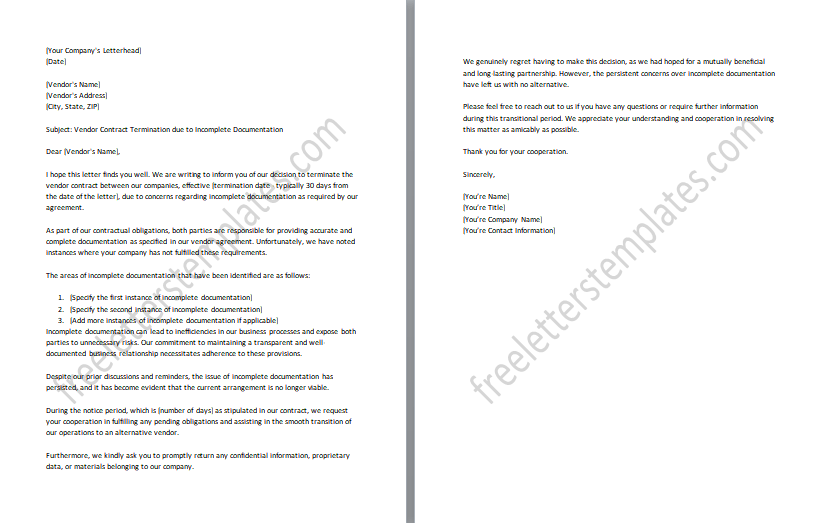
#10: Intellectual Property Violation – Vendor Notice
The “Intellectual Property Violation – Vendor Notice” is a formal letter by a company to inform a vendor about their infringement of the company’s intellectual property rights. It specifies unauthorized use of proprietary information, trademarks, or copyrighted material. The letter takes the violation seriously and may result in terminating the agreement. It stresses the importance of respecting intellectual property and safeguarding the company’s innovations. The purpose is to address the violation and protect the company’s intellectual assets.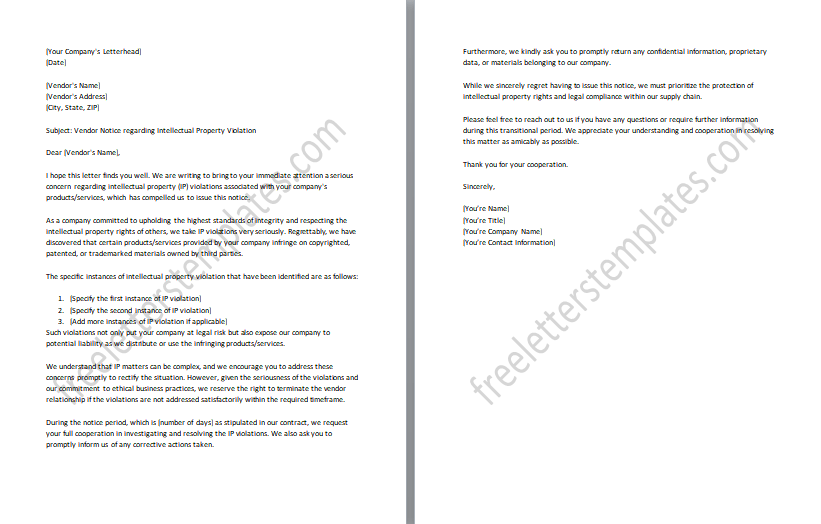
#11: Unsatisfactory Performance – Vendor Termination Letter
The “Unsatisfactory Performance – Vendor Termination Letter” is a formal communication used by a company to terminate its agreement due to consistently unsatisfactory performance in delivering products or services. It communicates the company’s decision to terminate the agreement based on the importance of maintaining high-quality standards and efficient operations. The letter specifies the effective date of the termination and requests cooperation in fulfilling any outstanding obligations during the notice period. The purpose of this letter is to seek an alternative vendor that can consistently meet the company’s performance expectations and ensure the smooth running of business operations.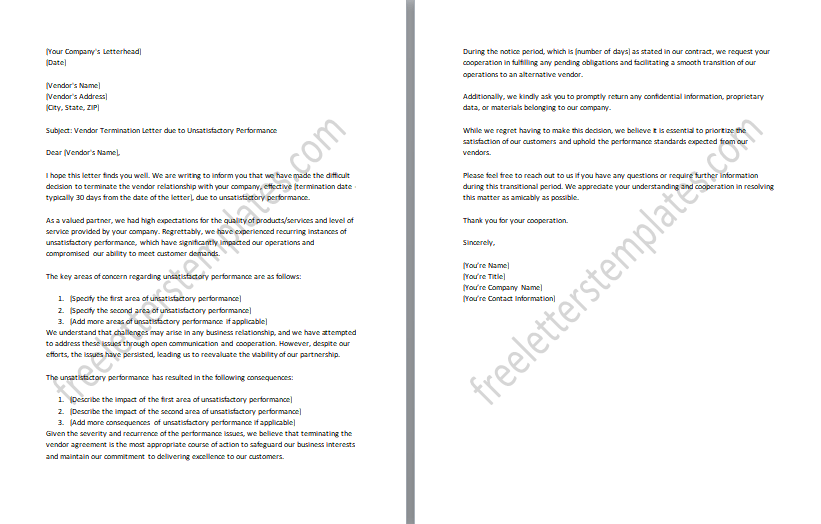
#12: Strategic Changes – Vendor Agreement Cancellation
The “Strategic Changes – Vendor Agreement Cancellation” is a formal communication used by a company to cancel its agreement due to strategic changes in its business operations. The letter explains that the company has undergone significant shifts in its business strategies or objectives, which necessitate a reevaluation of its vendor partnerships. It communicates the company’s decision to cancel the agreement in light of these strategic changes. The letter provides the effective date of the cancellation and requests cooperation in fulfilling any pending obligations during the notice period. The purpose of this letter is to realign the company’s relationships with its new strategic direction, ensuring that partnerships support the company’s current business goals and objectives effectively.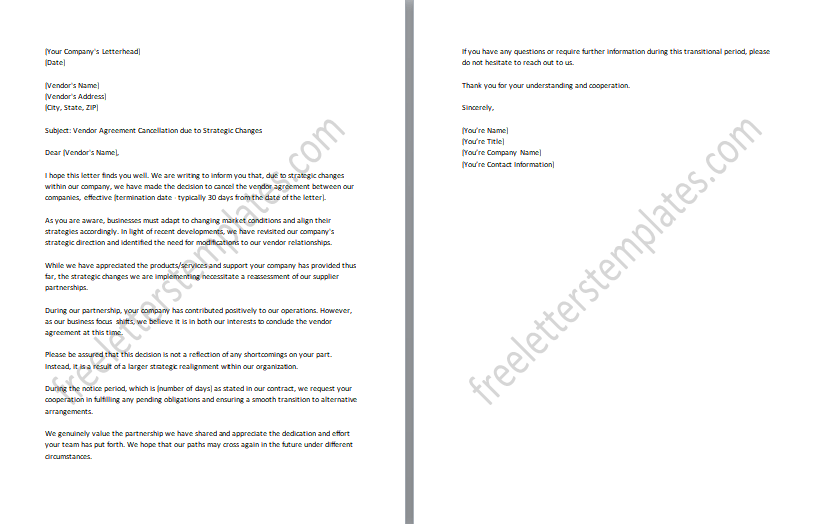
#13: Merger or Acquisition – Vendor Termination Update
The “Merger or Acquisition – Vendor Termination Update” is a formal communication used by a company to update a vendor about the termination of their agreement due to a merger or acquisition. The letter explains that the company has recently undergone a merger or acquisition, resulting in changes to its organizational structure and requirements. It communicates the company’s decision to terminate the agreement as a consequence of the merger or acquisition. The letter provides the effective date of the termination and requests cooperation in facilitating a smooth transition during this period of organizational change.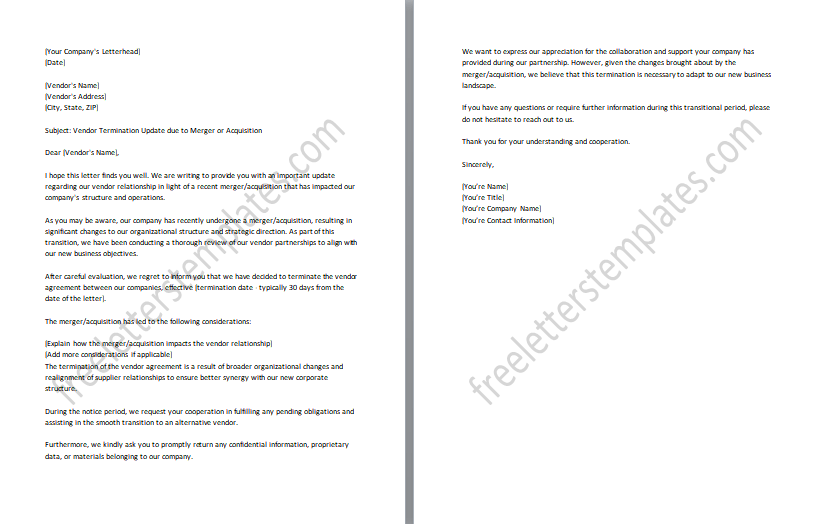
#14: Ethical Misconduct – Vendor Contract Ending
The “Ethical Misconduct – Vendor Contract Ending” is a formal communication used to terminate a contract due to ethical misconduct. The letter explains that the company has uncovered instances of unethical behavior or practices by the vendor, which goes against the company’s values and principles. It communicates the company’s decision to end the contract to uphold ethical standards and protect its reputation. The letter sets the effective date of the contract termination and requests cooperation in fulfilling any pending obligations during the notice period. The purpose of this letter is to take a firm stance against ethical misconduct and seek alternatives that share the company’s commitment to ethical business practices.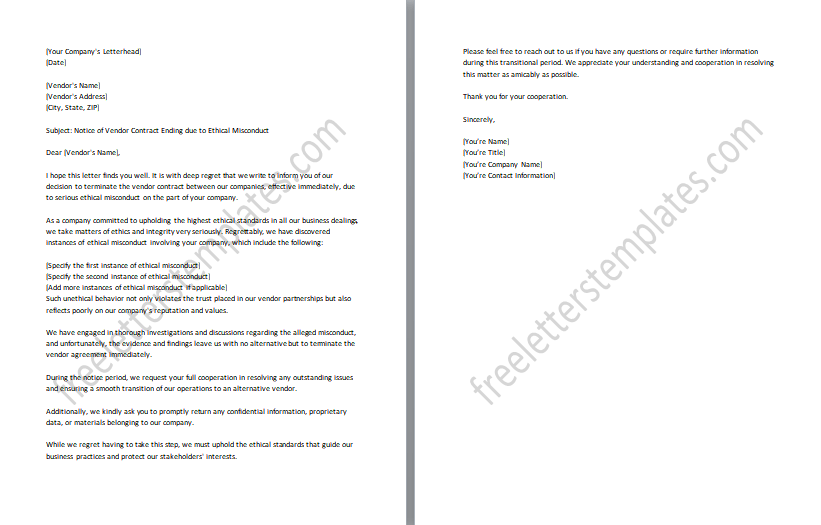
#15: Capacity Limitation – Vendor Termination Notice
The “Capacity Limitation – Vendor Termination Notice” is a formal communication used by a company to notify a vendor of their termination due to capacity limitations. It communicates the company’s decision to terminate the agreement based on the need for a vendor who can handle the company’s capacity requirements effectively. The letter specifies the effective date of the termination and requests cooperation in fulfilling any outstanding obligations during the notice period. The purpose of this letter is to seek alternatives that can meet the company’s capacity needs and ensure the smooth flow of business operations.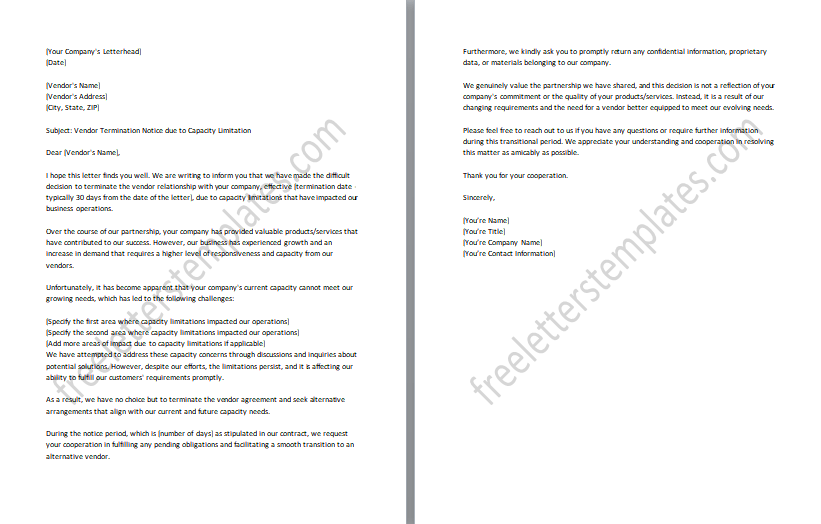
#16: Non-Disclosure Breach – Vendor Termination Letter
The “Non-Disclosure Breach – Vendor Termination Letter” is a formal communication used by a company to terminate its vendor agreement due to a breach of non-disclosure obligations. It communicates the company’s decision to terminate the agreement in response to this breach to protect its proprietary information and maintain confidentiality. The letter sets the effective date of the termination and requests cooperation in fulfilling any pending obligations during the notice period. The purpose of this letter is to uphold the company’s non-disclosure obligations and seek alternatives that can prioritize confidentiality and safeguard the company’s sensitive information.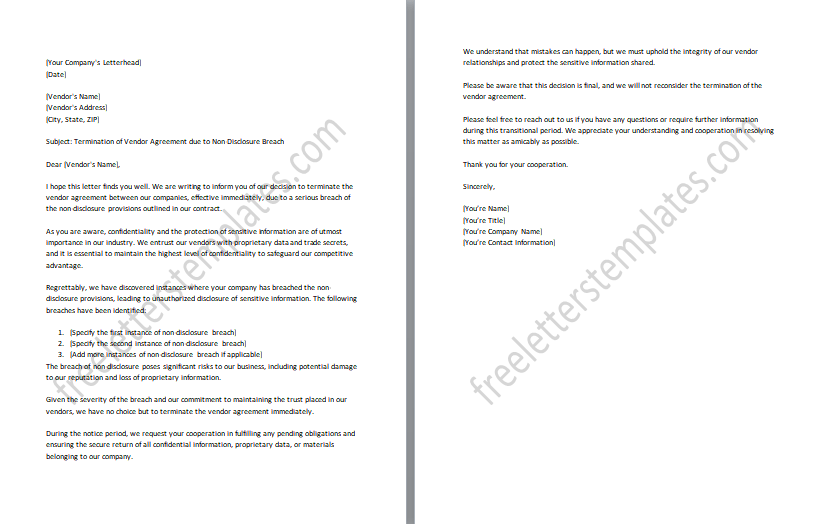
#17: Invoicing Issue – Vendor Contract Cancellation
The “Invoicing Issue – Vendor Contract Cancellation” is a formal communication used by a company to cancel its vendor contract due to persistent invoicing issues. It communicates the company’s decision to terminate the contract based on the importance of seamless invoicing processes and financial accuracy. The letter specifies the effective date of the contract cancellation and requests cooperation in resolving any outstanding invoicing matters during the notice period. The purpose of this letter is to seek an alternative that can maintain a reliable and efficient invoicing system that aligns with the company’s financial requirements and accounting practices.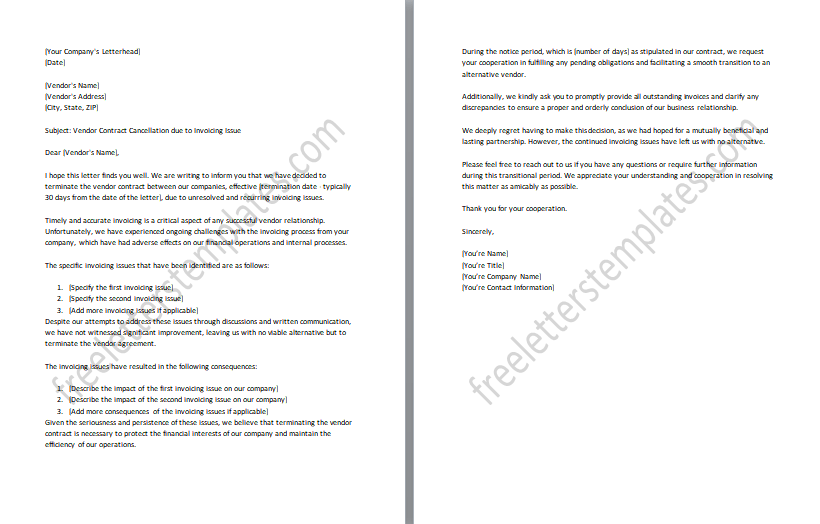
#18: Vendor Consolidation – Contract Termination Notice
The “Vendor Consolidation – Contract Termination Notice” is a formal communication used by a company to terminate its contract due to a consolidation of partnerships. The letter states that the company is undergoing a consolidation process to streamline operations and optimize relationships. As a result, the company has decided to terminate the agreement to align its base with its new consolidation strategy. The letter specifies the effective date of the contract termination and requests the vendor’s cooperation in facilitating a smooth transition during this period of organizational change.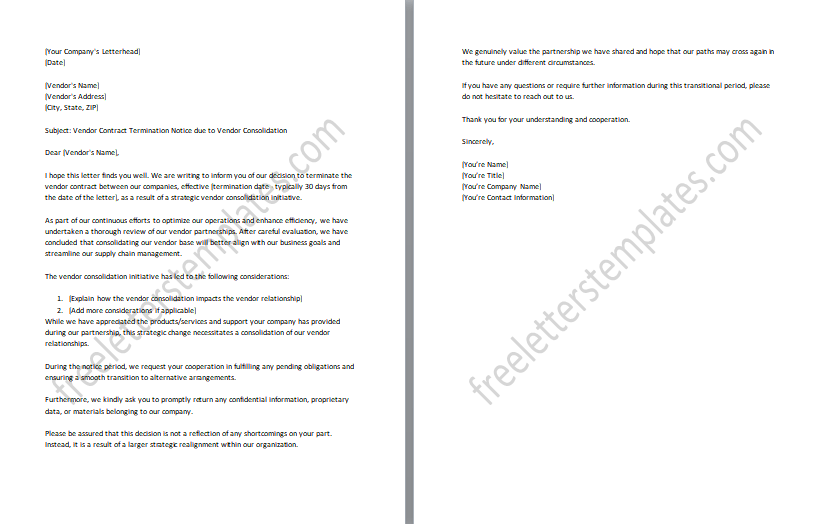
#19: Contract Expiry – Vendor Termination Announcement
The “Contract Expiry – Vendor Termination Announcement” is a formal communication used by a company to announce the termination of an agreement due to contract expiry. The letter informs that the contractual period has reached its end, and the agreement will not be renewed. It communicates the company’s decision to conclude the relationship based on the expiration of the contract. The letter may express appreciation for the vendor’s past services and contributions during the contract term. The purpose of this letter is to notify them about the contract expiry and formally conclude the agreement while leaving the possibility of future collaboration open through potential re-negotiation or consideration for future projects.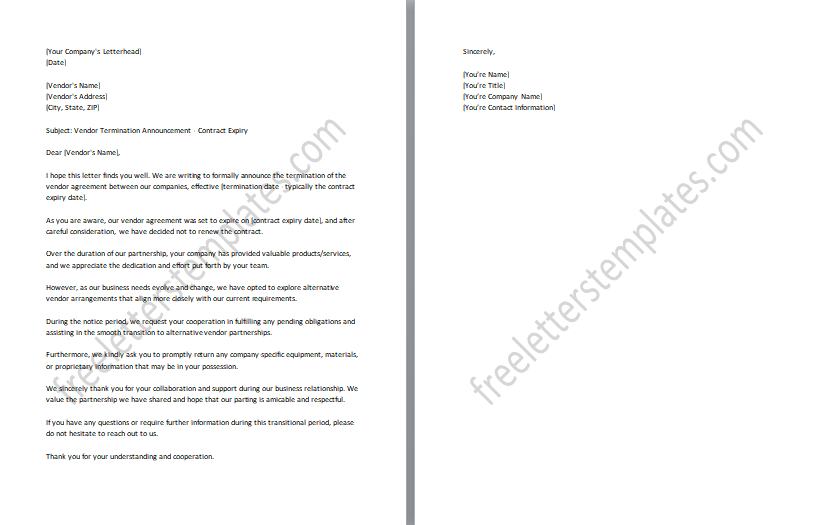
#20: Discontinued Product Line – Vendor Notice
The “Discontinued Product Line – Vendor Notice” is a formal communication used by a company to notify about the discontinuation of a specific product line for which the supplied products or services. It communicates the company’s decision to inform the vendor about the discontinuation of the product line and the subsequent cessation of orders or services related to that product line. The letter may express appreciation for the vendor’s past contributions to the product line. It may also provide information on the effective date of the discontinuation and request cooperation in handling any remaining orders or services during the notice period. The purpose of this letter is to notify the vendor about the discontinued product line and adjust the operations accordingly, focusing on other product lines or seeking alternative business opportunities.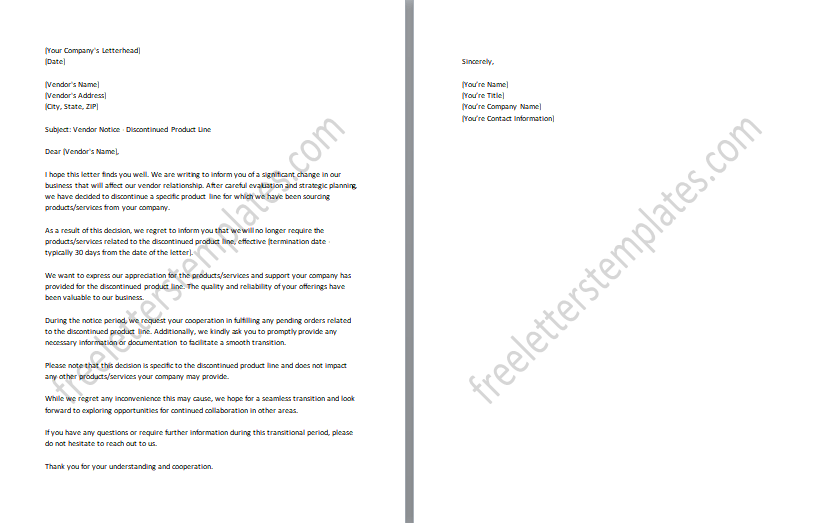
#21: Communication Failure – Vendor Termination Letter
The “Communication Failure – Termination Letter” is a formal notice of termination issued by a company to a vendor due to persistent breakdowns in communication. The letter explains that the company has encountered ongoing challenges in effectively communicating with the vendor, resulting in operational inefficiencies and missed deadlines. It communicates the company’s decision to terminate the agreement based on the importance of clear and timely communication for a successful partnership. The letter specifies the effective date of the termination and requests cooperation in fulfilling any pending obligations during the notice period. The purpose of this letter is to seek alternatives that prioritize open and reliable communication to enhance collaboration and streamline business processes.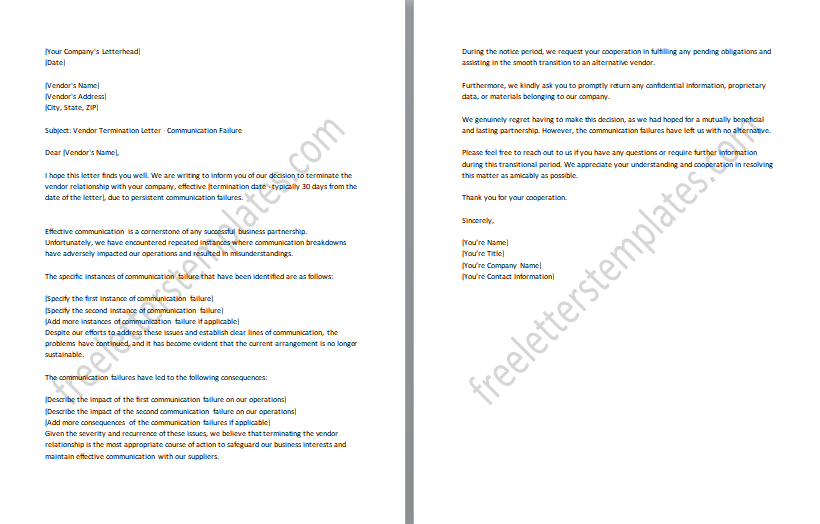
#22: Legal or Regulatory Violation – Vendor Removal
The “Legal or Regulatory Violation – Vendor Removal” is a formal communication used by a company to remove from its approved list due to a violation of legal or regulatory requirements. The letter explains that the company has discovered instances where the vendor has breached applicable laws or regulations, resulting in potential legal liabilities for the company. It communicates the company’s decision to remove the vendor from the approved list to mitigate legal and compliance risks. The letter specifies the effective date of the removal and requests cooperation in fulfilling any outstanding obligations during the notice period.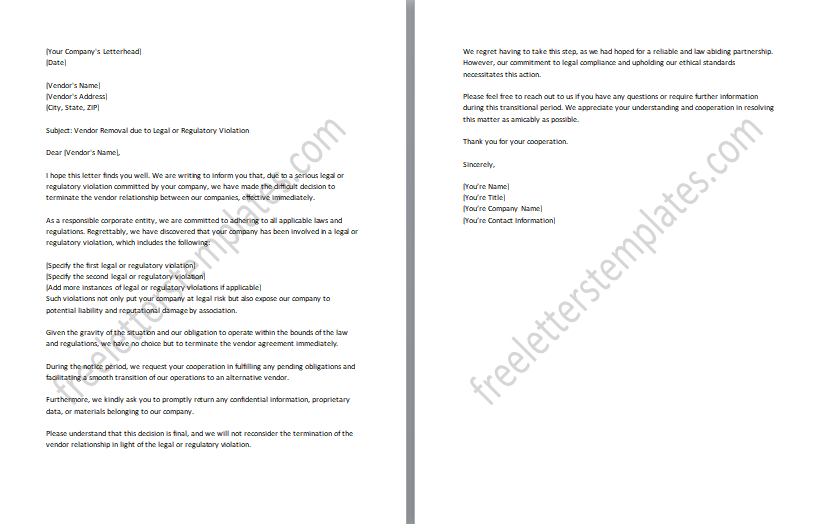
#23: Certification Lapse – Vendor Contract Ended
The “Certification Lapse – Vendor Contract Ended” is a formal communication used by a company to inform that their contract has come to an end due to a lapse in required certifications. The letter states that the company had previously required certain certifications from the vendor to meet regulatory or industry standards. It communicates the company’s decision to end the contract based on the importance of maintaining compliance and meeting necessary standards. The letter specifies the effective date of the contract termination and requests cooperation in fulfilling any remaining obligations during the notice period. The purpose of this letter is to seek alternatives who possess the necessary certifications to ensure continued regulatory compliance and adherence to industry standards.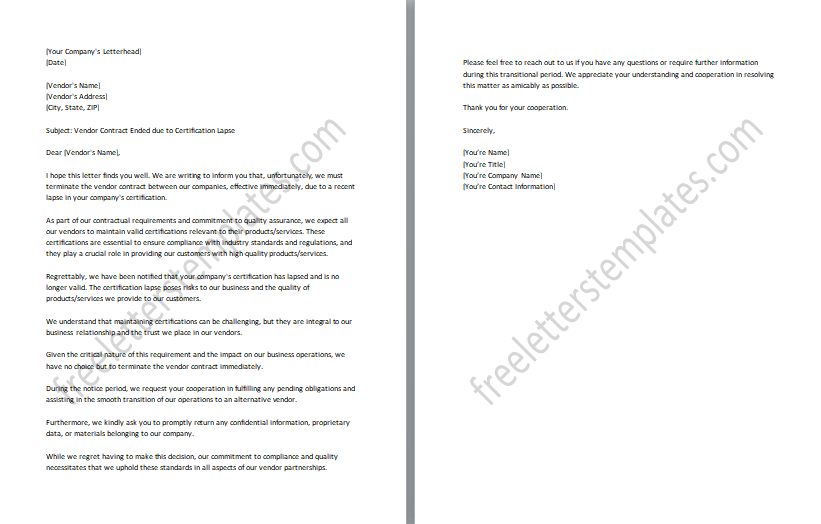
#24: Competitive Disadvantage – Vendor Termination
The “Competitive Disadvantage – Vendor Termination” is a formal communication used by a company to terminate its agreement due to the vendor’s inability to offer a competitive advantage in the market. The letter explains that the company has faced challenges in maintaining a competitive edge when utilizing the products or services. This lack of advantage has negatively impacted the company’s market position and profitability. It communicates the company’s decision to terminate the vendor agreement to seek alternatives that can better contribute to the company’s competitive strategies. The letter specifies the effective date of the termination and requests cooperation in fulfilling any pending obligations during the notice period.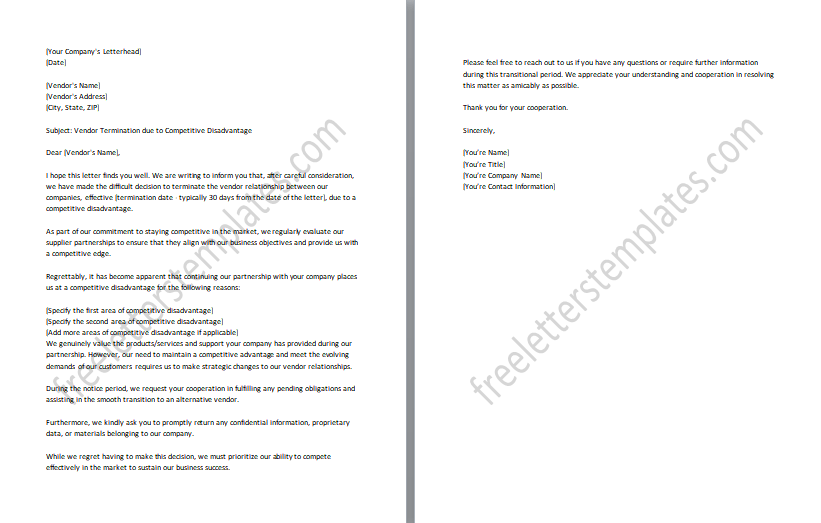
#25: Ethical and Sustainability Concerns – Vendor Notice
The “Ethical and Sustainability Concerns – Vendor Notice” serves as a formal notification regarding ethical and sustainability matters. The letter explicitly raises concerns about specific practices or actions that may be inconsistent with the company’s values. It underscores the importance of addressing these issues collaboratively to ensure mutual adherence to ethical and sustainable business practices. The letter aims to establish open communication channels with the vendor to address and rectify the concerns raised, fostering a mutually beneficial and responsible business partnership.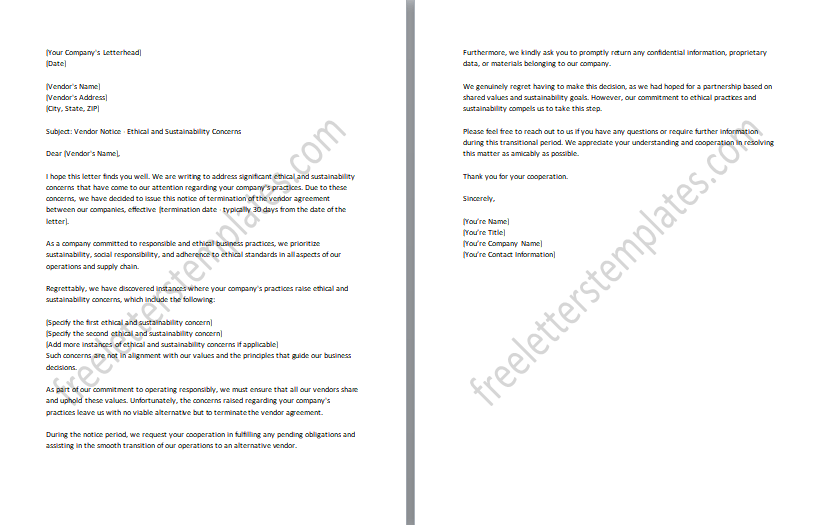
#26: Insufficient Support – Vendor Contract Termination
The “Insufficient Support – Vendor Contract Termination” is a formal communication used by a company to terminate its contract due to the lack of adequate support. The letter explains that the company has encountered ongoing challenges with the level of support provided by the vendor, leading to inefficiencies and disruptions in business operations. It communicates the company’s decision to terminate the contract based on the importance of receiving timely and sufficient support to meet business needs. The letter specifies the effective date of the termination and requests cooperation in fulfilling any pending obligations during the notice period. The purpose of this letter is to seek alternatives that can provide the necessary level of support to ensure smooth and effective business operations for the company.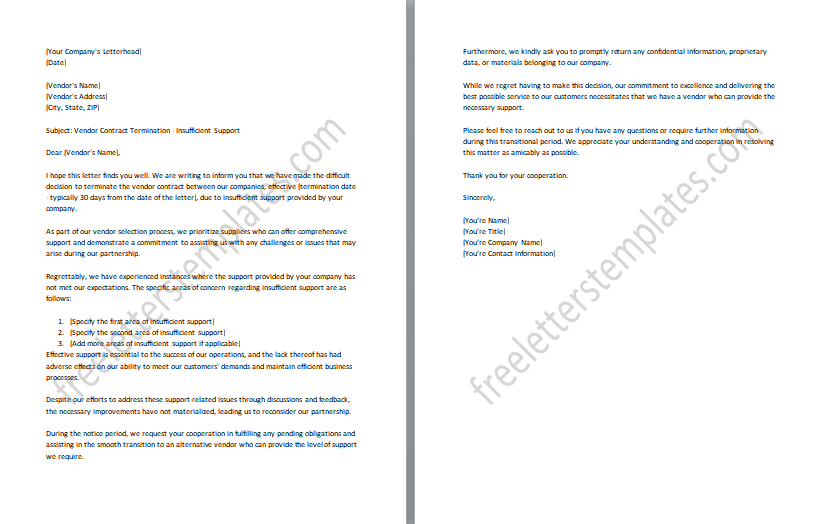
#27: Security Breach – Vendor Termination Notice
The “Security Breach – Vendor Termination Notice” is a formal communication used by a company to terminate its agreement following a security breach. It communicates the company’s decision to terminate the agreement based on the importance of safeguarding confidential data and maintaining a secure business environment. The letter specifies the effective date of the termination and requests cooperation in handling any remaining obligations during the notice period. The purpose of this letter is to prioritize data security and seek alternatives that prioritize robust security measures to protect the company’s sensitive information and maintain the trust of its customers.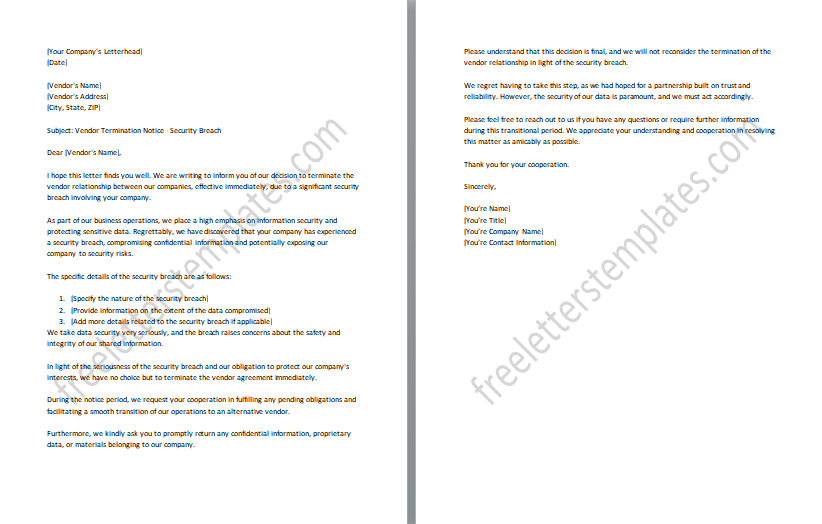
#28: Scaling Capacity Concerns – Vendor Termination
The “Scaling Capacity Concerns – Vendor Termination” is a formal communication used by a company to terminate its agreement due to concerns related to the capacity to scale its services or products. It communicates the company’s decision to terminate the agreement based on the importance of partnering with vendors who can effectively scale their capacity to meet the company’s growing needs. The letter specifies the effective date of the termination and requests cooperation in fulfilling any pending obligations during the notice period.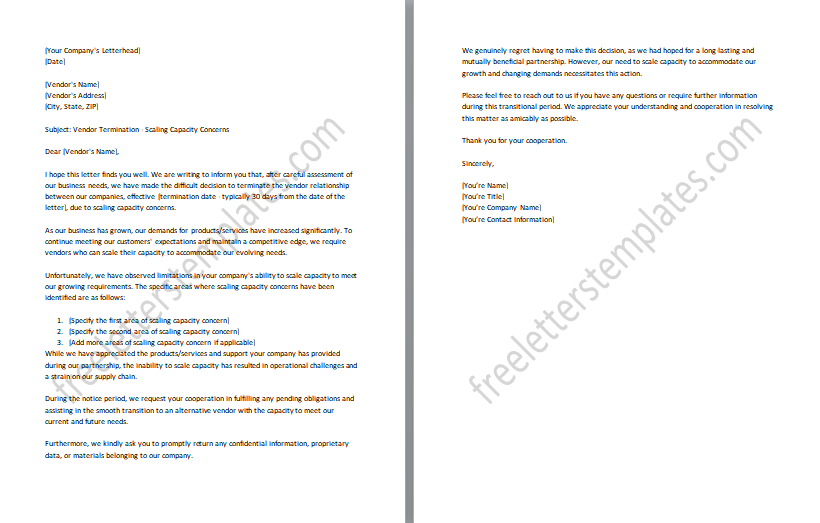
#29: Dissolution of Partnership – Vendor Removal Letter
The “Dissolution of Partnership – Vendor Removal Letter” is a formal communication used by a company to remove a from its list of approved partners due to the dissolution of the existing partnership. It communicates the company’s decision to remove the vendor from the list of approved partners in light of the partnership dissolution. The letter specifies the effective date of the removal and may express appreciation for the past collaboration and contributions during the partnership.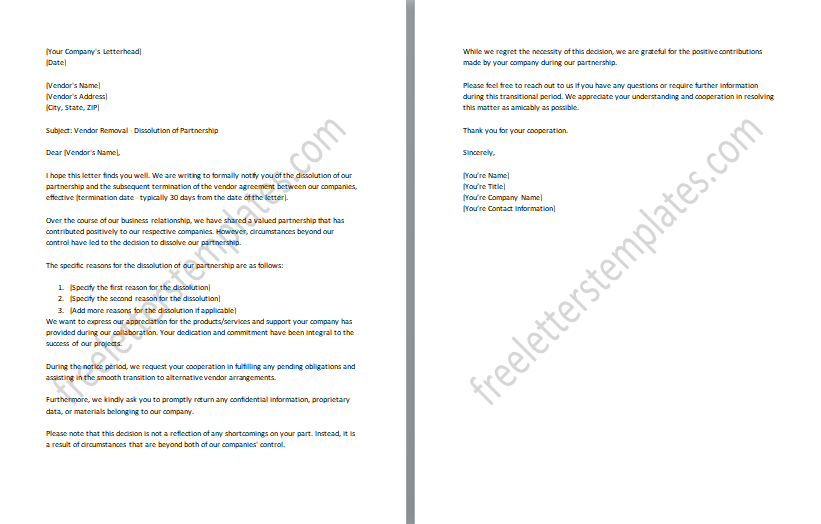
#30: Change in Company Ownership – Vendor Termination
The “Change in Company Ownership – Vendor Termination” is a formal communication used by a company to terminate its agreement due to a change in company ownership. The letter explains that the company has changed ownership, which has resulted in a reassessment of partnerships. It communicates the company’s decision to terminate the agreement as part of the transition process under the new ownership. The letter specifies the effective date of the termination and may express appreciation for the vendor’s past services and contributions during the partnership. It requests cooperation in fulfilling any outstanding obligations during the notice period.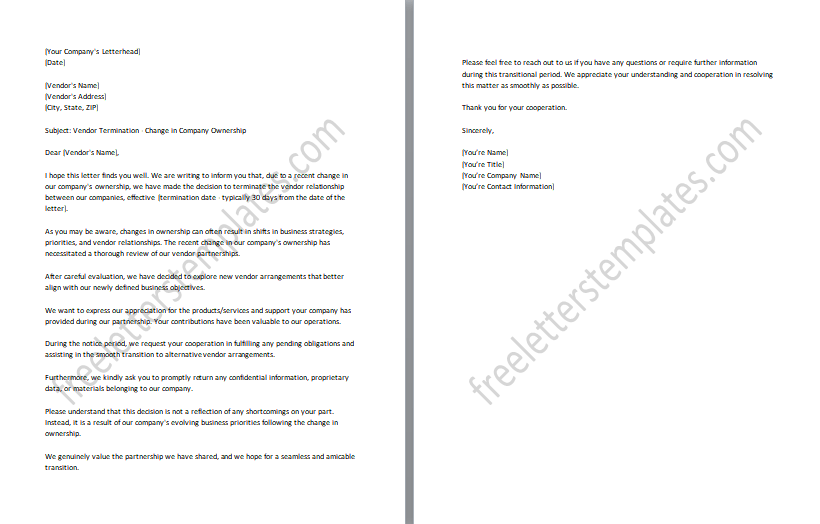
#31: Force Majeure Event – Vendor Contract Ended
The “Force Majeure Event – Vendor Contract Ended” is a formal communication used by a company to inform a vendor that their contract has been terminated due to a force majeure event. The letter explains that unforeseen circumstances or events beyond the control of both parties have occurred, making it impossible to continue the agreement. It communicates the company’s decision to end the contract based on the force majeure event’s impact on business operations and continuity. The letter may specify the effective date of the contract termination and may request cooperation in handling any remaining obligations during the notice period.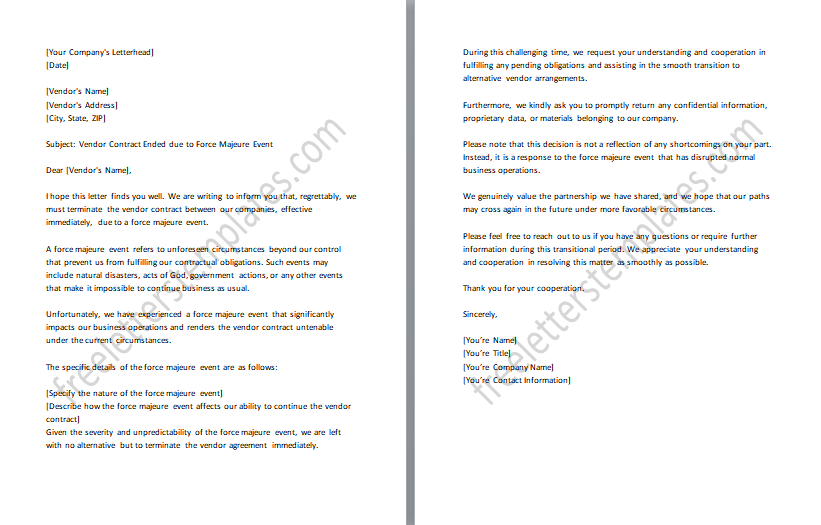
#32: Persistent Customer Complaints – Vendor Termination
The “Persistent Customer Complaints – Vendor Termination” is a formal communication used by a company to terminate its vendor agreement due to ongoing and unresolved customer complaints related to the vendor’s products or services. The letter explains that despite repeated attempts to address the customer complaints and improve performance, the issues persist, negatively impacting the company’s reputation and customer satisfaction. The letter specifies the effective date of the termination and may request cooperation in fulfilling any outstanding obligations during the notice period. The purpose of this letter is to prioritize customer satisfaction and seek alternatives that can consistently meet the company’s quality and service standards to ensure continued customer loyalty and trust.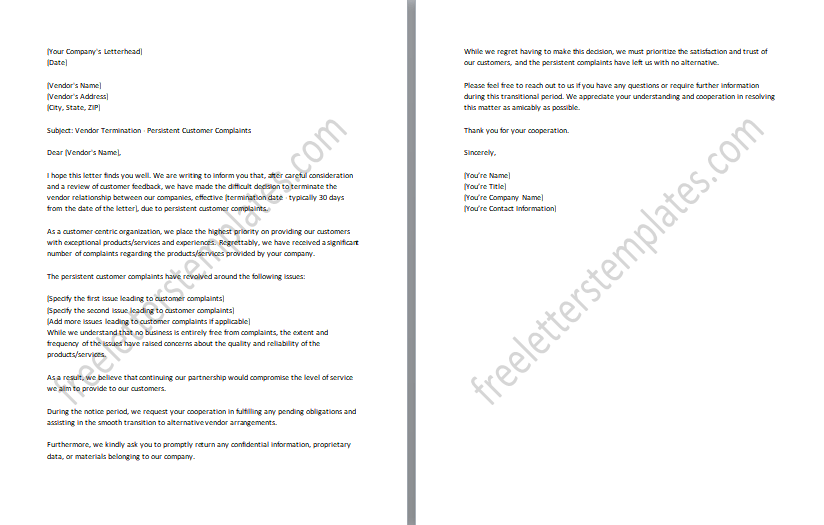
How-to Guides and Tutorials
Creating step-by-step guides and tutorials is an excellent way to demonstrate how to use your products or services effectively and provide value to your customers. Here are some tips for creating compelling how-to guides and tutorials for your website:
- Identify Topics: Research your target audience’s pain points and common questions related to your products or services. Identify topics that will address these issues and provide valuable solutions.
- Clear and Concise Steps: Break down each process into clear and easy-to-follow steps. Use bullet points or numbered lists to make it visually organized and straightforward.
- Visuals and Multimedia: Include images, screenshots, or videos to illustrate each step. Visual aids can significantly enhance understanding and engagement.
- Use Simple Language: Avoid using technical jargon or complicated language. Keep your instructions simple and easy to understand for all users.
- Address Potential Challenges: Anticipate any potential challenges or roadblocks that users might encounter during the process. Provide solutions or troubleshooting tips to overcome these obstacles.
- Test Your Guides: Before publishing, have a few individuals test your guides to ensure that the instructions are clear and that they can successfully follow the steps.
- Add Call-to-Action: At the end of the tutorial, include a call-to-action encouraging users to take the next step, such as trying out your product, signing up for a free trial, or contacting your sales team for more information.
- Organize Guides in a Library: Create a dedicated section on your website to house all your how-to guides and tutorials, making them easily accessible to your audience.
- Update Regularly: As your products or services evolve or new features are added, update your guides accordingly to ensure accuracy and relevancy.
- Gather Feedback: Encourage users to provide feedback on your guides and tutorials. Use this feedback to improve future content and address any potential gaps.
Professional Tone
Exactly! Maintaining a professional and respectful tone in the vendor termination letter is crucial, regardless of the reasons for termination. A positive reputation and business decorum are vital for your company’s image and relationships within the industry. Even in challenging situations, approaching the termination with respect and professionalism can help to minimize potential conflicts and preserve a positive perception of your company.
When crafting the letter, focus on providing clear and concise information about the termination without resorting to negative language or personal attacks. Avoid placing blame or making accusations, and instead, focus on stating the facts objectively. Remember, the vendor may be disappointed or upset by the termination, and displaying empathy and understanding can help ease the process. Offering any assistance or support during the transition period can demonstrate goodwill and a commitment to fair business practices.
By maintaining a professional and respectful tone, you uphold your company’s values and integrity, which can leave a lasting positive impression, even in challenging circumstances. It also reflects well on your company’s leadership and decision-making processes.
Concluding Thoughts
In conclusion, our “Vendor Termination Letters” page serves as a comprehensive resource to guide you through the process of terminating agreements with professionalism, efficiency, and integrity. From understanding the importance of maintaining a positive reputation and professional tone in the letters to providing adequate notice and seeking legal advice in complex situations, we strive to equip you with the necessary tools for handling terminations effectively.
Our tips and guides emphasize the significance of clear communication, compliance with contractual obligations, and prioritizing the needs of your company and customers. By adhering to best practices and considering the unique circumstances surrounding each termination, you can navigate these challenging situations while preserving valuable business relationships.
← Previous Article
« 25 Streamlined Service Termination Letter Templates for Smooth Farewells